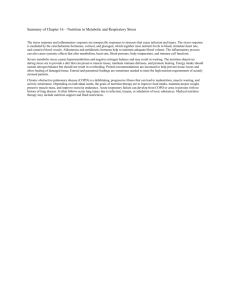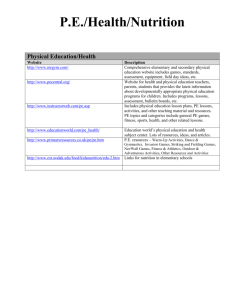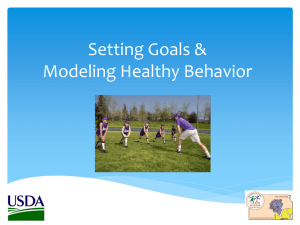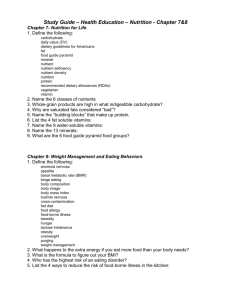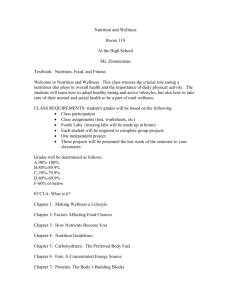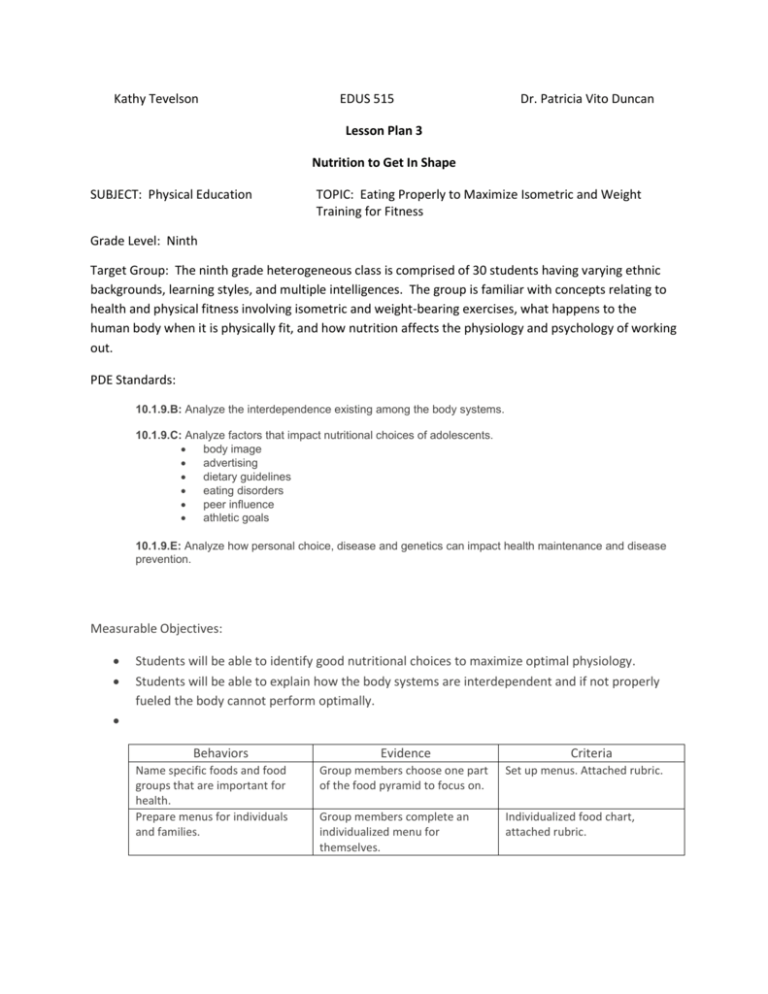
Kathy Tevelson
EDUS 515
Dr. Patricia Vito Duncan
Lesson Plan 3
Nutrition to Get In Shape
SUBJECT: Physical Education
TOPIC: Eating Properly to Maximize Isometric and Weight
Training for Fitness
Grade Level: Ninth
Target Group: The ninth grade heterogeneous class is comprised of 30 students having varying ethnic
backgrounds, learning styles, and multiple intelligences. The group is familiar with concepts relating to
health and physical fitness involving isometric and weight-bearing exercises, what happens to the
human body when it is physically fit, and how nutrition affects the physiology and psychology of working
out.
PDE Standards:
10.1.9.B: Analyze the interdependence existing among the body systems.
10.1.9.C: Analyze factors that impact nutritional choices of adolescents.
body image
advertising
dietary guidelines
eating disorders
peer influence
athletic goals
10.1.9.E: Analyze how personal choice, disease and genetics can impact health maintenance and disease
prevention.
Measurable Objectives:
Students will be able to identify good nutritional choices to maximize optimal physiology.
Students will be able to explain how the body systems are interdependent and if not properly
fueled the body cannot perform optimally.
Behaviors
Name specific foods and food
groups that are important for
health.
Prepare menus for individuals
and families.
Evidence
Criteria
Group members choose one part
of the food pyramid to focus on.
Set up menus. Attached rubric.
Group members complete an
individualized menu for
themselves.
Individualized food chart,
attached rubric.
Teaching to the Objectives
Summary of Concepts
How does eating properly affect the body as a whole?
How does eating properly affect the muscle groups that were exercised during the workout
routine?
How interdependent are the body systems with good nutrition?
How are food choices affected by a student’s body image, advertising, dietary guidelines, eating
disorders, peer influences, and athletic goals?
ESTIMATED
TIME
TEACHING TO THE OBJECTIVES
7 minutes
35 minutes
DIFFERENTIATION
INTRO: Based on former knowledge and
new information introduced, students will
list the food pyramid and concern
themselves with the food groups and how
their food choices relate to the exercises
done in the previous lesson plan.
Students will identify how the foods will
feed their body systems and what the
outcomes are if they don’t fuel their
bodies properly. Students will also
identify how the body systems react when
they are fueled properly and the
outcomes. Students will also identify what
happens when body image and eating
disorders interfere with proper nutritional
choices, and how athletic goals affect
food choices.
DEVELOPMENTAL ACTIVITIES:
Process: Visual
learners may want to
draw and label the
food pyramid; Auditory
learners may want to
repeat the food groups
as they label them on
the pyramid.
Display a sketch of the human body and ask
students how the body systems are
interdependent. Students will then break down
the food groups and decide what each food
groups will do for the body systems and how the
body reacts as a whole to good nutrition and to
bad nutrition.
Process: Provide a
picture of the human
body to which students
can refer and label as
well as a food pyramid.
Record the reactions that the muscle
groups display when fed well and when
fed poorly or when not fed at all.
Have students offer suggestions as to the
purpose each food group serves and the
overall affect it will have on the human
body. Record the suggestions on the
picture of the human body.
Review the list of good foods to fuel the
body and the effects these foods will have
on the body.
Explain that students will identify how
proper nutrition will affect the body.
Students will also demonstrate how poor
nutrition will affect the body and how
eating disorders will adversely affect the
body. Students will review with each
other what they discover.
Students will be divided into five groups;
each group will focus on one of the
muscle groups learned in Lesson 2
exercises and how proper nutrition affects
Group organization
dependent on teacher
discretion to optimize
performance for all
students.
Process: Students
may be given specific
body systems to focus
on to further their
critical thinking skills
to maximize
opportunity for
success.
the muscle system(s) and the body
systems. The focus questions for the
study are, “What body system does this
particular food affect positively or
negatively?” and “How will eating this
particular food benefit or hinder overall
fitness?” The workspace should
accommodate all students and provide
adequate space for the investigation.
Review the directions for the activity.
1. Discuss the human body’s
muscle groups and determine
who understands the principles
of what good nutrition does for
the body.
2. Observe the proper breakdown
of food and food groups and
determine how proper or poor
will affect the involved muscle
group(s) and body systems.
Students should record their
individual observations on their
food and body charts.
Provide handouts to which students can
refer as they are working.
Students determine which exercises really
taxed the muscle group(s) and the body
systems and what foods are needed to
refuel and feed the body and complete
one chart for the group, recording their
observations.
Students will also explain how eating
disorders, body image, advertising, and
poor nutrition are all important in how the
body reacts and functions.
Students will write an explanation of how
the exercises affected the muscle groups
and how refueling with proper nutrition
will aid the body in proper muscle growth
and healing and how proper nutrition
affects overall physical sense.
ASSESSMENT: Students will be able to name
food groups and how. Also, students will be
able to explain which foods are fuels for
those who exercise as in Lesson 2 and how
proper and poor nutrition affects overall
health and fitness. A chart will be scored
according to the rubric and explanation will
be scored for content and manner of
presentation.
Process: Accelerated
students can focus on
additional body
systems to further
learn how nutrition
affects the muscle
groups and the body
systems.
Teacher monitors the
five groups and checks
the accuracy of
information in the food
charts.
Teacher provides
assistance for creating
a list of bullet points
from which sentences
can be created. Wait
time can be altered to
enhance group
performance.
3 minutes
CLOSURE: Display a picture of the human body
and various athletes. Have volunteer students
provide input as to what muscle group(s) and
what body system(S) is/are visible and/or
affected by exercise and elicit student ideas as to
how nutrition affects the muscle group(s) and
body systems and overall fitness and health.
Ask the students what they learned from the
experience.
Materials: Food group chart and pyramid and sketch of the human body.
Follow-Up:
As a class, what foods provide proper fuel for which muscle groups. Determine what meals and foods are
essential for a group of nonathletic students, semiathletic students, and athletic students. Also, determine
how eating disorders and advertising wreak havoc on the human body by not fueling or improperly fueling
the body. Record these findings in a chart, note the greatest number to the least number, and create a bar
graph to show the numbers in each group. Review the results.
Make a list of proper foods that that might benefit someone who wants to get in shape or maintain good
physical fitness.
References:
Dorland’s Illustrated Medical Dictionary.
©2002 – 2010. Merck Sharp & Dohme Corp., a subsidiary of Merck & Co., Inc. All
rights reserved. MerckSource is a registered trademark of Merck Sharp & Dohme Corp., a subsidiary of Merck & Co., Inc.
This site provides a diagram of the human body.
http://www.mercksource.com/pp/us/cns/cns_hl_dorlands_split.jsp?pg=/ppdocs/us/common/dorlands/dorland/misc/dmda-b-000.htm
US Department of Health and Human Services: http://www.health.gov/DietaryGuidelines/
Nutrition.gov: http://www.nutrition.gov/nal_display/index.php?info_center=11&tax_level=1
Food Safety and Nutrition Information for Kids and Teens:
http://www.fda.gov/Food/ResourcesForYou/Consumers/KidsTeens/default.htm
MyPyramid: http://www.fns.usda.gov/tn/kids-pyramid.html
EXAMPLE EXPLANATION
The above students develop proper menus and how the body and proper nutrition perform help the body
perform optimally when exercising and understand how food and proper nutrition affects the muscle groups,
body systems, and health and overall fitness.

